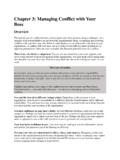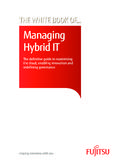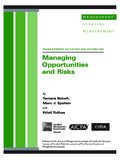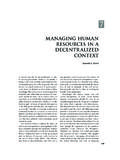Transcription of MANAGING TEAMS EFFECTIVELY
1 MANAGING . TEAMS . EFFECTIVELY . by Alan R. Caron 2004 Caron & Associates Centre for Strategic Management MANAGING TEAMS EFFECTIVELY . Welcome! This MANAGING TEAMS EFFECTIVELY guide is a compilation of best practices derived from noteworthy experts and years of experience in working with TEAMS in companies across many industries, from start-ups to Fortune 50's. The simple, easy to read format provides helpful hints and no-nonsense rules of the road that are useful in any team environment. These practices can enhance team member and team leader effectiveness, even for experienced team leaders. Many of these practices are also helpful for one-on-one relationships in every day life. You may already be familiar with some of the practices in this guide, and some will be provide new, enlightening information.
2 This tells of many simple truths that are so often forgotten in life and the workplace. My hope is that these practices will serve you well. Alan R. Caron BE AN EFFECTIVE team MEMBER. Whatever your position today, you need to develop team skills. Executives many times participate on TEAMS as an equal with lower ranking employees. Being an effective team member is much more than just showing up on time and volunteering to contribute. It requires the practice of very specific skills. PRACTICE: Being open and candid Not cautious and guarded Listen carefully and actively Read an article on active listening to learn No chit-chatting on the side Offer constructive comments Not critical comments Ask clarifying questions Try to understand the feelings of others Admit confusion or lack of knowledge Help facilitate understanding and agreement Arrive on time and stay until the end Be warm and friendly 2.
3 MANAGING TEAMS EFFECTIVELY . Executives are typically competitive, controlling personalities. This sometimes makes it difficult for us to engage in dialogue, especially when you believe you already know the answers. DIALOGUE VS. DEBATE Adapted from Lily Evans Dialogue Debate is based on vs. is based on 1. Asking vs. Knowing 2. Questions vs. Answers 3. Sharing vs. Winning 4. Full Participation vs. Domineering 5. Respect vs. Power 6. Exploring vs. (Re)stating 7. Listening vs. Proving Work to build team trust. It is a critical ingredient for MANAGING TEAMS . Make sure people don't say these things about you: 1. Acts more concerned about his or her own welfare than anything else. 2. Sends mixed messages so that I never know where he or she stands (in other words, is inconsistent).
4 3. Avoids taking responsibility for action, by passing the buck or dropping the ball. 4. Jumps to conclusions without checking the facts. 5. Makes excuses or blames others when things don't work out; points fingers. 3. MANAGING TEAMS EFFECTIVELY . What is the Most Important Factor in team success ? Getting along 33%. Listening 29%. Setting priorities 21%. Feeling recognized 6%. Having everyone agree 6%. Deciding who's in charge 4%. percent of respondents MANNER. Productive Unproductive Speak Up If I Disagree Not Speak Up If I Agree If I Disagree What's the reward for speaking up? What's the punishment for speaking up? What's the reward for not speaking up? Just DO YOUR BEST to be;. Honest Sensitive to the feelings and views of others A proactive listener and contributor and Have a good attitude and pleasant demeanor 4.
5 MANAGING TEAMS EFFECTIVELY . EFFECTIVE team MEETING MANAGEMENT. We all have opportunities to manage a team meeting from time to time. Here are a few pointers to make the job easier and more productive. Define Key Roles and Responsibilities A. Leader Sets initial agenda Contracts with team on final agenda, priority order Contracts with team on meeting norms, roles each person plays Keeps meeting on track Guides, rather than dominates Summarizes the meeting action times (To Do List). Conducts the processing at the end of the meeting (continue more of, less of). B. Gatekeeper Acts as back up to leader to make sure everyone is involved Primary role is to keep the meeting on track C. Timekeeper (often combined with Gatekeeper).
6 Contracts with team on time allotted agenda items Reminds team of time remaining on agenda items D. Action Recorder Records ideas, decisions, and actions for To Do List . on flipchart (or other large visual tool). Assists the leader in summarizing the meeting To Do List and processing at the end of the meeting. 5. MANAGING TEAMS EFFECTIVELY . Get an Outside Facilitator For guidance on meeting processes, to back up the leader, to provide feedback on the meeting process, and assist the team in improving the meeting management process. Use a Flipchart Always note action items, items of agreement, salient points, issues, etc., on chart for everyone at the meeting to see. This is a powerful tool for facilitating, focusing, keeping order, and getting agreement.
7 Your Body Speaks Communication Methods Words = 7%. Tone = 38%. Body Language = 55%. Total = 100%. What you do speaks louder than what you say! Participation is Key We remember: 10% of what we read 20% of what we hear 30% of what we see 50% of what we see and hear 70% of what we say and do 90% of what we explain as we do 6. MANAGING TEAMS EFFECTIVELY . YOUR CHECKLIST FOR. EFFECTIVE MEETING MANAGEMENT. Potential Ground Rules: success of the meeting is each person's responsibility. Each person is responsible for maintenance /. staying on track . Develop an agenda with meeting purpose(s) and time frame. Develop a set of norms or guidelines for behavior. Check status of ongoing To Do List . Prioritize multiple issues quickly.
8 Does it have joint impact? Develop To Do List for issues not needed to be before the entire group. Stay on track. Help us all to stay on track. No long-winded speeches. Keep the overall goal in mind at all times. Each of us is 100% responsible for the success of this event. Listen, listen, listen actively to others, and then speak. Speak only for yourself. Set clear decision-making ground rules. Don't duck issues/conflict. Don't be polite to the extreme. Take brakes together. Give everyone a chance to participant. Ask for the views of non-participants. Be as open and honest as you can. Be sensitive to other's needs. Process the meeting: a. continue b. more of c. less of Celebrate successes. 7. MANAGING TEAMS EFFECTIVELY .
9 REMEMBER. Nobody has all the answers. Ask every team member for his or her thoughts and views frequently. Those who say nothing usually have something important to say! BE HUMBLE. "To whom God wants to destroy, he gives 20 years of success .". REMEMBER THE POWER OF THE WORD. The word is your most important tool or your most destructive weapon. Be careful what you say, your words have enormous impact: Choose your words carefully. Think before you speak, don't just react. Count to 10 before you respond. Be kind and positive, not critical. examples: If I said to you, You don't look very good today , it would likely affect how you feel, and you'd probably check yourself out in the mirror several times throughout the day.
10 If we were at a dance and I told my partner, who is a respectable dancer, You are a poor dancer , my partner would be self-conscious and concerned and maybe even dance poorly, simply as a result of my words. You, as an executive, carry exponentially more power with a just a word within your work environment or on a team . None of us usually consciously realize our word power. 8. MANAGING TEAMS EFFECTIVELY . BE IMPECCABLE WITH YOUR WORD. Say only what you mean and mean what you say. Very carefully choose your word tools and word weapons. All words are one or the other. Once you speak, you can't retract the words or their impact. As a Kentucky farmer once said, You can't make a pig by running the sausage machine backwards.








